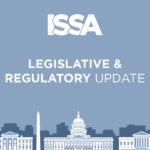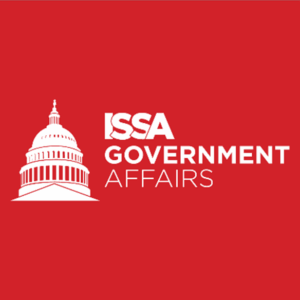ISSA Leg. & Reg. Update – From Tax Relief to Tariff Battles
 Welcome to the latest ISSA Legislative & Regulatory Update, a biweekly roundup of the public-policy issues currently impacting the full cleaning supply chain. This update touches on unpacking ISSA’s Advocacy agenda, the International WELL Building Institute’s second annual Healthy Building Policy Summit on September 29, trade deals that the Trump administration has struck thus far, and more.
Welcome to the latest ISSA Legislative & Regulatory Update, a biweekly roundup of the public-policy issues currently impacting the full cleaning supply chain. This update touches on unpacking ISSA’s Advocacy agenda, the International WELL Building Institute’s second annual Healthy Building Policy Summit on September 29, trade deals that the Trump administration has struck thus far, and more.
Want to stay informed about critical government affairs impacting the cleaning and facility-solutions industry? Sign up here to have the ISSA Legislative & Regulatory Update emailed directly to you every other week.
ISSA Advocacy
 |
From Tax Relief to Tariff Battles: ISSA’s Advocacy Agenda Unpacked
What it means: As global economic pressures and domestic policy shifts converge, the cleaning industry faces a critical juncture. At the heart of the response is John Nothdurft, ISSA’s Director of Government Affairs, who helps shape how cleaning professionals navigate complex legislative terrain, on everything from tariffs and tax policy to workforce development and EPA regulations.
Why it matters: “We try to be your eyes and ears in DC and in state capitals,” Nothdurft said. “We know we can’t weigh in on everything, so we prioritize the issues that matter most to our members—those with the potential to either help or hurt your business.”
What ISSA is doing: ISSA’s recent impact report highlights how that advocacy translates into action. Over 2,000 cleaning professionals have joined the association’s Advocates for Clean initiative, taking part in town halls, responding to action alerts, and engaging in direct legislative outreach. Earlier this year, more than 140 industry leaders gathered in Washington for the Clean Advocacy Summit, meeting with over 170 congressional offices, the White House, EPA, and the U.S. Department of Labor.
“The results speak for themselves,” Nothdurft said. “We secured small business tax cuts, helped expand 529 plan eligibility to include industry training, and advanced policies that make cleaning a respected, long-term career.” Learn more and support the ISSA Advocacy Fund

IWBI Healthy Building Policy Summit
Why attend: ISSA is proud to sponsor the International WELL Building Institute’s (IWBI) second annual Healthy Building Policy Summit on September 29 in Washington, DC. The summit aims to spark dynamic discussion, foster engagement, and drive meaningful advancements in key policy areas—from the need to improve indoor air quality and the evolving technology landscape to pioneering state and local policy innovations and emerging code and regulatory frameworks. Attendees will discuss policy actions to accelerate the creation of healthier environments, while learning from compelling speakers across various sectors. The summit will also highlight members of Congress and administration officials who are at the forefront of advancing policies to support healthy buildings. Learn more and register

Thank you to ISSA member-company Prestige Maintenance USA for its recent contribution to the ISSA Advocacy Fund at the Advocate level.
Additional Updates
Regulatory
Trade Deals Trump Has Made Ahead of August 1 Deadline
After months of delays, President Trump’s global tariffs are scheduled to take effect at the end of this week. On April 2, Trump announced “reciprocal” tariffs on dozens of countries, using trade deficits to help calculate the tariff rates.
A week later, he lowered those rates to 10 percent for three months as markets reacted negatively, allowing time for countries to negotiate. As the 90-day window was closing earlier this month, Trump sent letters to countries informing them of the new reciprocal rates that, he said, would take effect August 1. The White House has secured several significant trade deals since the President’s sweeping tariffs were first announced in the spring.
Yesterday, Trump announced a trade deal with the European Union, setting baseline tariffs at 15 percent on European goods, lower than the 30 percent rate that he had threatened to impose next month. The EU will purchase US$750 billion of energy products from the U.S. as part of the deal, and agreed to invest an additional $600 billion in the U.S.
The 15 percent is likely a new minimum tariff level for most U.S. trading partners. Economists and trade analysts say that tariffs at that level will affect companies’ decisions and are expected to contribute to higher prices for Americans but won’t stop global trade flows. The EU deal should ease anxieties that Trump’s drive could lead to a broader trade war and provide some clarity for cleaning businesses. Learn more (The Hill)
DOL Abandons Effort to End Subminimum Wage for Workers with Disabilities
The U.S. Department of Labor (DOL) withdrew a Biden-era rule that aimed to phase out a section of the Fair Labor Standards Act that allowed employers to pay certain workers with disabilities wage rates that fall below the federal minimum wage. Learn more (HR Dive)
OSHA Updates Penalty Guidelines
The U.S. Occupational Safety and Health Administration (OSHA) updated its guidance on penalty and debt-collection procedures in the Occupational Safety and Health Administration’s Field Operations Manual to “minimize the burden on small businesses and increase prompt hazard abatement.” Learn more (OSHA)
EPA
Adds 18 Chemicals to Safer Chemical Ingredients List
The U.S. Environmental Protection Agency (EPA) added 18 chemicals to the Safer Chemical Ingredients List, a list of chemicals that EPA’s Safer Choice program has evaluated and determined meet Safer Choice criteria. Learn more (EPA)
Seeks Public Comment on New Plan to Streamline Tracking of Bilingual Labeling Adoption, Releases Updated Bilingual Labeling Resources
The U.S Environmental Protection Agency (EPA) is taking public comments on a new, streamlined approach for how the agency plans to track the adoption of bilingual pesticide labeling. The agency also announced updates to the Bilingual Labeling Questions and Answers webpage, which provides guidance on bilingual labeling requirements for various types of pesticide products. Learn more (EPA)
MoCRA Implementation Delay Creates Legal Exposure for Stakeholders
The delayed implementation of the Modernization of Cosmetics Regulation Act (MoCRA) creates greater legal exposure for stakeholders and is more reason for stakeholders to proactively plan compliance. Learn more (Citeline)
Homan: Trump Farm/Hospitality-Worker Policy May Be Coming
White House Border Czar Tom Homan said that the Trump administration is considering possible changes to its immigration enforcement policy as it relates to farm and hospitality workers. Learn more (The Hill)
Legislative
Dignity Act Would Grant Legal Status to Certain Illegal Immigrant Workers
U.S. Representatives Maria Elvira Salazar (R-FL-27) and Veronica Escobar (D-TX-16) introduced legislation to reform the U.S. immigration system, including offering legal status for certain illegal immigrants to continue working in the country. The Dignity Act of 2025 would allow illegal immigrants who have been in the U.S. since before 2021 the opportunity to apply for up to seven years of legal status with work authorization. The immigrants would pay restitution and check in regularly with the U.S. Department of Homeland Security, and their legal status could be renewed based on good conduct and restitution. ISSA supports this bipartisan bill to expand the cleaning workforce. Learn more (Fox News)
Bill Introduced to Make Current Joint-Employer Rule Permanent
A bill working its way through the U.S. House of Representatives aims to permanently define when two businesses can be considered joint employers–an issue with significant implications for the more than 800,000 franchise establishments across the country. The Save Local Business Act, sponsored by Representative James Comer (R-KY-1), would lock in the current, narrower joint-employer definition that requires “direct and immediate control” over essential terms of employment. This would replace the shifting regulatory standards that have bounced back and forth for more than a decade, depending on which party controls the U.S. National Labor Relations Board. Learn more (Entrepreneur)
State News
CA
Labor Commissioner Cites Ritz-Carlton, Subcontractors More Than $2M
The California Labor Commissioner’s Office cited the Ritz-Carlton Hotel Company LLC and three janitorial contractors for more than US$2 million for misclassifying 155 janitors as independent contractors at its Half Moon Bay hotel. The citations include $1.9 million in wages and penalties payable to the affected workers. Learn more (State of California Department of Industrial Relations)
Bill Targets PFAS in Cleaners, Cookware
The California Legislature is considering a sweeping new bill, SB 682, that would ban cookware and cleaning products that contain PFAS in an effort to protect public health. Learn more (EWG)
Microplastics Proposed for Candidate Chemical Listing
California’s Department of Toxic Substances Control (DTSC) proposed adding microplastics as a Candidate Chemical to be regulated under the Safer Consumer Products program. This action and its subsequent steps could provide DTSC with the means to regulate a wide variety of plastic-containing products, including packaging, in an unprecedented way. Learn more (DLA Piper)
MO Repeals Paid Sick Leave Law
Eight months after voters approved it, Missouri Governor Mike Kehoe signed the repeal of a law that had guaranteed paid sick leave to workers and inflationary adjustments to the minimum wage. Learn more (AP)














